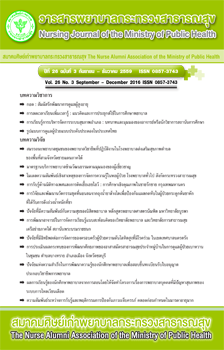ปัจจัยที่มีอิทธิพลต่อการจัดการของครอบครัวผู้ป่วยความดันโลหิตสูงที่มีโรคร่วม ในเขตเทศบาลนครตรัง
Main Article Content
Abstract
บทคัดย่อ
การวิจัยเชิงพรรณนาครั้งนี้มีวัตถุประสงค์เพื่อศึกษาปัจจัยทำนายการจัดการของครอบครัวผู้ป่วยความดันโลหิตสูงที่มีโรคร่วมในเขตเทศบาลนครตรัง ตามแนวคิดการจัดการของครอบครัว กลุ่มตัวอย่างเป็นผู้ที่มีบทบาทในการจัดการของครอบครัวผู้ป่วยความดันโลหิตสูงที่มีโรคร่วม ได้มาโดยวิธีสุ่มแบบหลายขั้นตอนจำนวน 226 คน เครื่องมือที่ใช้ในการเก็บรวบรวมข้อมูลเป็นแบบสอบถาม จำนวน 7 ชุด ประกอบด้วย (1) แบบสอบถามข้อมูลของครอบครัว (2) แบบสอบถามเกี่ยวกับฐานะทางเศรษฐกิจของครอบครัว (3) แบบสอบถามสัมพันธภาพในครอบครัว (4) แบบสอบถามพฤติกรรมสุขภาพครอบครัว (5) แบบสอบถามการรับรู้ความรุนแรงของโรคของครอบครัว (6) แบบสอบถามเครือข่ายทางสังคมและ (7) แบบสอบถามการจัดการของครอบครัว เครื่องมือการวิจัยทุกชุดได้ผ่านการตรวจสอบความตรงของเนื้อหาโดยผู้ทรงคุณวุฒิ 3 ท่านและทดสอบความเที่ยงของเครื่องมือได้ค่าความเที่ยงอยู่ระหว่าง 0.80-0.85 วิเคราะห์ข้อมูลโดยการหาค่าร้อยละ ค่าเฉลี่ย ส่วนเบี่ยงเบนมาตรฐาน สหสัมพันธ์เพียร์สัน และการวิเคราะห์ถดถอยพหุคูณ
ผลการวิจัยพบว่า 1) การจัดการของครอบครัวผู้ป่วยความดันโลหิตสูงที่มีโรคร่วมอยู่ในระดับปานกลาง คะแนนเฉลี่ยเท่ากับ 43.31 (SD=6.08) 2) ตัวแปรที่มีความสัมพันธ์กับการจัดการของครอบครัวผู้ป่วยความดันโลหิตสูงที่มีโรคร่วมอย่างมีนัยสำคัญทางสถิติที่ระดับ .05 คือ สัมพันธภาพในครอบครัว พฤติกรรมสุขภาพครอบครัว ฐานะทางเศรษฐกิจของครอบครัว และเครือข่ายทางสังคม (r= .436, .360, .286 และ .263 ตามลำดับ) 3) ตัวแปรที่สามารถพยากรณ์การจัดการของครอบครัวผู้ป่วยความดันโลหิตสูงที่มีโรคร่วมได้คือ สัมพันธภาพในครอบครัว และเครือข่ายทางสังคม ร้อยละ 35.0 (R2=.350)
ผลการวิจัยครั้งนี้สามารถสรุปได้ว่า บุคลากรด้านสุขภาพควรนำปัจจัยด้านสัมพันธภาพในครอบครัวและเครือข่ายทางสังคม มาประยุกต์ใช้กับการดูแลสุขภาพของผู้ป่วยความดันโลหิตสูงที่มีโรคร่วมที่ต้องมีการปรับพฤติกรรมอย่างต่อเนื่อง เพื่อลดอัตราการเกิดภาวะแทรกซ้อนของโรคความดันโลหิตสูงที่มีโรคร่วมให้น้อยลง
Factors Affecting Family Management for the Patients with Hypertension and Co-morbidity in Trang Municipality
Kwanta Bunwad*
Wararat Tiparat*
Preeda Salalux**
Sopit Suwanweala*
Sodsee Patum**
Abstract
This descriptive research investigated the predicting factors for family management for patients with hypertension and co-morbidity in Trang Municipality. The conceptual framework of the study was based on the family management concept. The sample of 226 family members recruited by multi-stage random sampling. These family members played a leading role in the management of hypertension and co-morbidity in their families. The research instruments included a questionnaire consisting seven parts: 1) family general information, 2) family economic status, 3) family relationships, 4) family health behaviors, 5) perceived severity of family disease, 6) family social networks, and 7) family management. Content validity analysis of the questionnaire was confirmed by three experts. Cronbach’s alpha coefficient was employed to test the reliability of the questionnaire; the range of the coefficient being 0.80-0.85. Data were analyzed using percentage, mean, standard deviation, Pearson product moment correlation, and stepwise multiple regression.
The results of this study showed that: 1) overall, the family management of hypertension and co-morbidity in their families was at a moderate level ( = 43.31, SD= 6.08), 2) Family relationships, family health behaviors, family economic status, and family social networks were significantly correlated with family management for patients with hypertension and co-morbidity at a level of 0.05 (r= 0.44 ,0.36, 0.29 and 0.26, respectively) and 3) family relationships and family social networks accounted for 35 % of the variance in explaining the family management for patients with hypertension and co-morbidity (R2 = 0.35).
In conclusion, health care personnel should apply the factors regardingfamily relationships and social networks for the provision of health care of patients who have hypertension with co-morbidity, and require ongoing behavior modification in order to reduce complications of the disease.
Article Details
บทความและรายงานวิจัยในวารสารพยาบาลกระทรวงสาธารณสุข เป็นความคิดเห็นของ ผู้เขียน มิใช่ของคณะผู้จัดทำ และมิใช่ความรับผิดชอบของสมาคมศิษย์เก่าพยาบาลกระทรวงสาธารณสุข ซึ่งสามารถนำไปอ้างอิงได้

